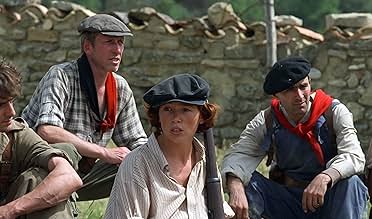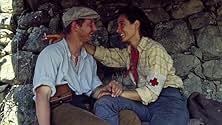अपनी भाषा में प्लॉट जोड़ेंDavid is an unemployed communist that comes to Spain in 1937 during the civil war to enroll the republicans and defend the democracy against the fascists. He makes friends between the soldie... सभी पढ़ेंDavid is an unemployed communist that comes to Spain in 1937 during the civil war to enroll the republicans and defend the democracy against the fascists. He makes friends between the soldiers.David is an unemployed communist that comes to Spain in 1937 during the civil war to enroll the republicans and defend the democracy against the fascists. He makes friends between the soldiers.
- 1 BAFTA अवार्ड के लिए नामांकित
- 8 जीत और कुल 5 नामांकन
- Maite
- (as Iciar Bollain)
- Juan Vidal
- (as Marc Martinez)
- Bernard Goujon
- (as Frederic Pierrot)
- Militia member
- (as Andres Aladren)
- Militia member
- (as Roca)
- Militia member
- (as Emili Samper)
फ़ीचर्ड समीक्षाएं
In tackling the Spanish Civil War any writer is faced with the overwhelming complexities that underlie the events. The regionalism (think only of the Catalan and Basque regions, let alone Galicia and Andalusia), the monarchy, the Catholic Church, landowners, trade unions, anarchists plus the leaderships of the Nationalist and Republican movements all combined to create a very tangled web. Add to that outside involvement, principally from Mussolini and Stalin, the vacillation of Britain and France and, of course, the omnipresence of Hitler, and anyone might wonder where to start.
Loach and Allen take their approach through the eyes of an unemployed Liverpudlian, David Carr (admirably played by Ian Hart) who, as a card-carrying member of the Communist Party, answers the call to fight for the Republic. We follow his exploits through a number of episodes, involving battles, falling in love, injury and, ultimately, a degree of disillusion as the reality of Stalin's views eventually come to dominate, and eventually destroy, his cause. The film is supremely well-made, highlighting the horrors, the camaraderie, and the political divisions. In particular, the debate amongst the militia about collectivisation after they have taken a small town takes no sides, but simply allows a number of valid arguments to be exposed within the context of the shifting sands of the war.
There is still ample material for the industry to go on to make more films on this important period in history. But Loach has set the benchmark.
A left-wing lad goes to Spain, joins the otherwise totally obscure Marxist POUM militia, and experiences at first hand serious political differences with the Communists and their competing militia. Well, the lad does not actually get wounded in the throat during the course of the movie, but otherwise this is the biography of Eric Blair (George Orwell), as described in his book "Homage to Catalonia".
In spite of the single source cribbing, I did like this film in general since films about Spain in English, other than Canadian ones with Donald Sutherland as Dr. Norman Bethune, are few and far between.
It was wonderful to see a priest being shot in this film -- I don't mean it that way! -- since anti-clericalism was an important element both in the Spanish Civil War and in the French Revolution although it rarely seems to be mentioned much in the English-speaking world. The people in both countries felt the burden of traditional, oppressive, hypocritical Catholicism, just like the kind we had here in the Province of Quebec before the Quiet Revolution of the 1960's. At the other end of the political scale, the poor treatment of priests in Spain was a motivating force for Fascists in France to join the Charlemagne division of the Waffen SS to defend the cause of Christianity, or so The Sorrow and the Pity attests.
The Spanish war was about liberation from autocracy amidst a blizzard of competing, doctrinaire, left political philosophies. That was a really exciting time to be politically active, and there is a great scene of grassroots socialism in action at a town meeting.
The film has a rough-hewn, half-finished look characteristic of Ken Loach, but don't let that put you off. Anyone who can get worked up about the sometimes microscopic, casuistical differences between the Grits and the Tories, or the Democrats and the GOP, or New Labour and those other Tories, or Labor and National, or the SDP and the CDU, etc. should really love a movie, and a conflict, where the political spectrum is so broad for a change. Political animals of whatever bent should get a kick out of it.
British director Ken Loach made a film that finally attempts an anarchist's view of anarchists in Spain during the civil war against the fascists. The victors write history, so as losers of that war, their history has for too long remained untold. But this 1995 film, "Land & Freedom" shows what they were fighting for and what they were fighting against. One of the best aspects here is that the film also shows how the communists aggressively destroyed the anarchists more than their supposed common enemy. This I take as a lesson for today's left:
The melancholy hopelessness of our own 21st century is a consequence of that tragic defeat by the fascists -- largely because the Left fragmented and was brutally dominated by Leninist dictators. Historical progress is now merely spinning its wheels in futility, recycling every old thing again as a farce. The only solution is land and freedom.
P.S. Another sympathetic film based on these events is "For Whom the Bell Tolls" (1943) based on the Hemingway novel, starring Gary Cooper and Ingrid Bergman. This one is less politically aware however, so it focuses more on the romance. See info at http://www.imdb.com/title/tt0035896/combined
The crimes of the Stalinists are portrayed throughout the film -- they deny decent, modern weapons to those sections of the front which they do not control; they actively engage in repression against the POUM and the anarchists in Barcelona; in the pages of the British Daily Worker which we briefly see on the screen, we are shown the daily barrage of lies they spread (such as Trotsky's 'support' for Franco fascism).
Anyone who sees this film as simply a black-and-white, good vs evil portrayal of heroic young people aiding the brave Spaniards in their battle for freedom is missing what is, I believe, its main point. It is not primarily about Spain.
Seeing a film like this, I cannot forget the more typical Hollywood portrayals (at least in the last generation) of Communists. A film like "The Way We Were" shows the American Communist Party only during those moments when its positions would today be considered palatable (supporting the Spanish republic, backing Roosevelt and the US war effort in World War II, and later calling for nuclear disarmament).
It doesn't show the time of the Moscow Trials, nor the real role played by the Soviet Union and its agents in Spain, nor the Communist Party's opposition to fighting Hitler and the Nazis in 1939-41, nor the post-war period when the Party did what it could to encourage nuclear proliferation by passing on atomic secrets to Stalin.
Land and Freedom does try to show one of the Comintern's uglier moments, to its credit.
A film like this was made possible by the fact that Loach comes out of the British far left, and the British far left has long been dominated not by Stalinists but by their Marxist opponents -- primarily the Trotskyists of the Socialist Workers Party (SWP). Whatever disagreements I or others may have with the SWP (and they are many), at least they rejected Stalinism.
What we need are more films like this showing the real role played by Communist Parties all during the history of the Soviet regime. For example a film set in any European country during the period between September 1939 and June 1941 (the time of the Hitler-Stalin pact) which honestly portrays Communist parties as allies of the Nazis (even in occupied countries like Norway and France) would be welcome.
क्या आपको पता है
- ट्रिवियाAccording to Ken Loach, the debate in the village was the key scene in the film. He had local residents from the village play crowd members in that meeting.
- गूफ़Actually the rucksacks are the same as British 1908 pattern, and were made from 1929 onwards by La Industria Lonera in Barcelona, Spain.
- भाव
[last lines]
Kim, David's granddaughter: The other day I found this. It was amongst my granddad's papers, and I just thought it was, like, fitting for him. It's a poem by William Morris, and I'd just like to read it out: "Join in the battle, wherein no man can fail. For whoso fadeth and dieth, yet his deeds shall still prevail."
- क्रेज़ी क्रेडिटSpecial thanks to the people of Mirambel and Morella.
- साउंडट्रैकA Las Barricades
Courtesy of Confederación de Nacional dl Trabajo
टॉप पसंद
- How long is Land and Freedom?Alexa द्वारा संचालित
विवरण
- रिलीज़ की तारीख़
- कंट्री ऑफ़ ओरिजिन
- भाषाएं
- इस रूप में भी जाना जाता है
- Tierra y libertad
- फ़िल्माने की जगहें
- उत्पादन कंपनियां
- IMDbPro पर और कंपनी क्रेडिट देखें
बॉक्स ऑफ़िस
- बजट
- £25,00,000(अनुमानित)
- US और कनाडा में सकल
- $2,28,800
- US और कनाडा में पहले सप्ताह में कुल कमाई
- $8,144
- 17 मार्च 1996
- दुनिया भर में सकल
- $2,28,800
- चलने की अवधि1 घंटा 49 मिनट
- रंग
- ध्वनि मिश्रण
- पक्ष अनुपात
- 1.66 : 1
इस पेज में योगदान दें































